Guest post by Carla Arton and Nicholas Cummins
Many people are familiar with Jewish culture — through food, humor, holidays, or history. But fewer have explored what it means to live a Jewish life, especially in the United States. For religiously observant Jews, that can include honoring the Sabbath each week, studying sacred texts, following Jewish religious law, and practicing daily traditions that bring meaning and connection.
Judaism is a faith built on action. It encourages daily spiritual practice — through prayer, learning, and doing. None of this is easy or casual. That’s why, traditionally, Jewish education doesn’t begin with easy stories from the beginning of the Hebrew Bible (the Torah). Instead, it starts with the book of Leviticus — a more difficult text that teaches about holiness through discipline, responsibility, and sacrifice. The idea is simple: what’s most meaningful in life often takes real effort.
From a young age, Jewish students also learn with a partner in a method called havruta. The goal isn’t just to find the “right” answer, but to challenge each other and grow through discussion. In Judaism, study is not just learning — it’s a way of practicing faith. It’s a religious commandment done in partnership with others, through questioning, arguing, and reflecting together.
This spirit of active learning and living runs throughout Jewish life. Whether lighting candles on the Sabbath, following dietary traditions, helping others as part of repairing the world (tikkun olam), or simply asking tough questions, Judaism encourages people to engage with their faith as something alive and future facing, not just a set of beliefs.
In celebration of Jewish American Heritage Month, we asked Jewish and Religious Studies scholars at UVA and Jewish community leaders across Virginia to help us explore a simple but profound question: What does it mean to practice Judaism in America today?
The books they recommended come from many voices — Orthodox and Reform, traditional and modern, American and global. Some are deeply spiritual, others are personal, thought-provoking, or even challenging. That diversity reflects an important truth in Judaism: learning through conversation, even disagreement, helps deepen our understanding.
As author Sarah Hurwitz writes in her book “Here All Along”:
“This tradition belongs to all Jews — regardless of background, observance, or level of knowledge. It’s our inheritance. It’s up to each of us to claim it.”
If you’re not sure where to start your learning, we recommend Hurwitz’s “Here All Along” or “This Is My God” by Herman Wouk. For a quick and friendly overview of Jewish beliefs, customs, and culture, check out “The Jewish Book of Knowledge” and “The Newish Jewish Encyclopedia.”
We also invite you to visit “Hand and Scroll: Torah Pointers from the Barr Collection,” on display at the Fralin Museum of Art through July 20, 2025. The exhibit features ornate yadot (Torah pointers) from Jewish communities around the world. These ritual objects help bridge the gap between sacred text and embodied tradition — between the scroll and the hand that reaches for it.
What follows is a collection of books — both fiction and nonfiction — that open a window into Jewish religious life in America. These works invite readers to learn, reflect, and perhaps even wrestle with big ideas. All are available through the UVA Library.
Fiction
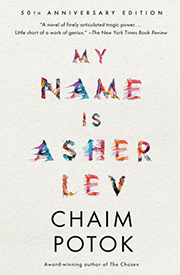 “My Name is Asher Lev” by Chaim Potok (Knopf, 1972)
“My Name is Asher Lev” by Chaim Potok (Knopf, 1972)
While “The Chosen” is Chaim Potok’s most widely known and celebrated novel, “My Name is Asher Lev” stands as an equally profound exploration of Jewish identity. In this coming-of-age story set in the mid-20th century, a Hasidic Jewish artist wrestles with the tension between religious tradition and creative freedom, raising timeless questions about faith, individuality, and the sacred boundaries of art.
Recommended by Lise Dobrin, Ph.D., Professor of Anthropology and Co-Curator, Fralin Art Museum Torah Pointer Exhibition, UVA:
“Asher is drawn to create art — including representations of the human form — which his family views as overstepping into a creative power that belongs to God alone. The novel raises deep questions about art, aniconism, and Jewish tradition that I’ve also encountered while working on the Torah pointer exhibition at the Fralin. Some of the objects were made by Jewish artists and could be used in ritual; others are best understood as artworks inspired by ritual, blurring the line between sacred use and artistic expression.”
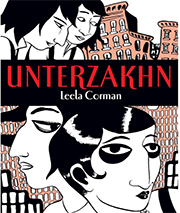 “Unterzakhn” by Leela Corman (Schocken Books, 2012)
“Unterzakhn” by Leela Corman (Schocken Books, 2012)
This graphic novel explores the lives of twin sisters in the Jewish immigrant neighborhoods of early 20th-century New York. Through stark visual storytelling, it engages questions of tradition, gender roles, and the moral ambiguities faced by observant women navigating American modernity. A gritty and visually arresting portrait of Jewish immigrant life from a feminist lens.
Recommended by Sam Shuman, Ph.D., Assistant Professor of Religious Studies, UVA.
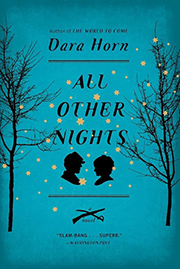 “All Other Nights” by Dara Horn (W.W. Norton & Co, 2009)
“All Other Nights” by Dara Horn (W.W. Norton & Co, 2009)
Dara Horn weaves a fast-paced, morally complex tale of identity, loyalty, and betrayal set during the American Civil War. With vivid prose and historical imagination, she brings a uniquely Jewish perspective to a defining chapter of American history.
Recommended by Elizabeth Shanks Alexander, Ph.D., Professor of Religious Studies, UVA:
“Terrific storytelling about Jewish spies in the Civil War. Much of the story takes place in Richmond. Spies are both confederate and union. Judah Benjamen, VP of the Confederacy, the highest-ranking Jew in national government, makes several appearances.”
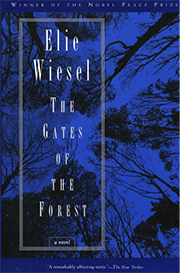 “The Gates of the Forest” by Elie Wiesel (Holt, Rinehart and Winston, 1966)
“The Gates of the Forest” by Elie Wiesel (Holt, Rinehart and Winston, 1966)
From Nobel laureate and Holocaust witness Elie Wiesel, this novel is a powerful exploration of postwar Jewish faith and identity. Set in the aftermath of the Holocaust, Wiesel’s novel follows a young Hungarian Jew grappling with faith, trauma, and spiritual memory in a Hasidic Brooklyn community.
Recommended by Jennifer Geddes, Ph.D., Associate Professor of Religious Studies, UVA:
"The novel does not offer easy answers about Jewish faith after the Holocaust — whether abandoning it or maintaining it."
Non-Fiction
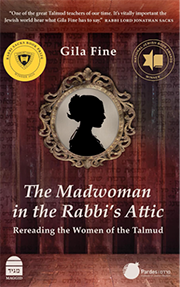 “The Madwoman in the Rabbi’s Attic” by Gila Fine (Maggid Books, 2024)
“The Madwoman in the Rabbi’s Attic” by Gila Fine (Maggid Books, 2024)
Winner of the 2024 National Jewish Book Award, the publication is a feminist rereading of seven women in the Talmud through classical archetypes, offering powerful literary and spiritual reinterpretations.
Recommended by Elizabeth Shanks Alexander, Ph.D., Professor of Religious Studies, UVA:
“[Fine] recontextualizes the stories by drawing on broader literary context to undermine the constraining vision of the archetypes.”
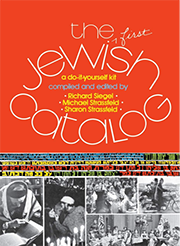 “The Jewish Catalogue: A Do-it-yourself Kit”by Michael Strassfeld et al. (The Jewish Publication Society of America, 1973)
“The Jewish Catalogue: A Do-it-yourself Kit”by Michael Strassfeld et al. (The Jewish Publication Society of America, 1973)
This 1970s grassroots guide helped American Jews re-engage with religious practice and ritual in participatory and accessible ways. It remains an influential example of how observant life was revived through creativity and community in the American context.
Recommended by Sam Shuman, Ph.D., Assistant Professor of Religious Studies, UVA.
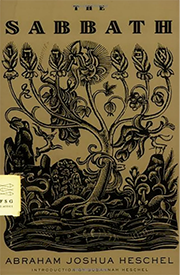 “The Sabbath” by Abraham Joshua Heschel (Farrar, Straus, 1952)
“The Sabbath” by Abraham Joshua Heschel (Farrar, Straus, 1952)
A poetic and philosophical meditation on Shabbat, Heschel's work emphasizes the sanctity of time over space and action. It offers a spiritual vision of rest as a form of resistance to modern busyness and materialism.
Recommended by Jeffrey Grossman, Ph.D., Professor of German and Jewish Studies, UVA:
“Even for an agnostic like myself, Heschel’s views on the ‘holiness’ of the Sabbath and the importance of sanctifying this one day in the week, are compelling … 'It is,’ in Heschel’s words, ‘a monument of resurrection of the dormant spirit of our souls.’”
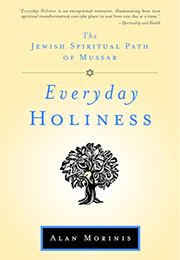 “Everyday Holiness: The Jewish Spiritual Path of Mussar” by Alan Morinis (Trumpeter, 2007)
“Everyday Holiness: The Jewish Spiritual Path of Mussar” by Alan Morinis (Trumpeter, 2007)
This accessible guide introduces Mussar, a Jewish ethical and spiritual tradition emphasizing character development. Dr. Morinis distills classic teachings into practical steps for cultivating virtues like humility, patience, and gratitude.
Recommended by Caroline Rody, Ph.D., Professor of English and Jewish Studies, UVA:
“This book makes accessible for contemporary American life an obscure (but increasingly well-known) nineteenth-century Lithuanian Jewish spiritual practice called Mussar. … What I like about this book is that it makes a visit to our hard-to-imagine, religious Eastern European Jewish ancestors and brings back a no-nonsense guide to thinking as they did about how we (even secular contemporary readers) can live better lives.”
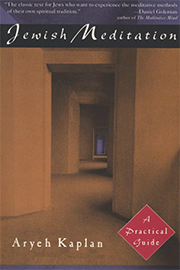 “Jewish Meditation: A Practical Guide” by Aryeh Kaplan (Schocken Books, 1995)
“Jewish Meditation: A Practical Guide” by Aryeh Kaplan (Schocken Books, 1995)
Kaplan's concise manual draws from traditional Jewish sources to present meditative practices rooted in halacha (Jewish law) and Kabbalah (Jewish mysticism). It demonstrates how mindfulness and embodiment can serve as avenues for religious devotion.
Recommended by Nicholas Cummins, Research Librarian for Economics & Commerce, UVA Library:
“I remember being deeply moved by his description of embodied meditation and how the physical body need not be dismissed or disparaged to commune with the divine. … Kaplan’s exploration of the significance of the word olam (universe) has continued to impact my thinking.”
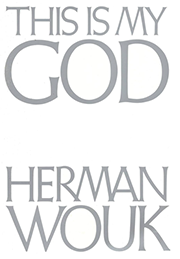 “This is My God” by Herman Wouk (Little, Brown, and Co, 1987)
“This is My God” by Herman Wouk (Little, Brown, and Co, 1987)
Written by one of America’s great Jewish novelists, “This is My God” is a warm, articulate, and personal account of Orthodox Jewish belief and practice. Wouk's work covers core observances from Shabbat to dietary laws. It is both explanatory and affirming, presenting religious life with clarity and conviction. A classic entry point for anyone seeking to understand Judaism from the inside.
Recommended by Rabbi Elisha Paul, Head of School, Rudlin Torah Academy, Richmond, VA.
 “My Jewish Year: 18 Holidays, One Wondering Jew” by Abigail Pogrebin (Fig Tree Books, 2017)
“My Jewish Year: 18 Holidays, One Wondering Jew” by Abigail Pogrebin (Fig Tree Books, 2017)
Part memoir, part spiritual travelogue, this thoughtful and often humorous book follows secular Jew Abigail Pogrebin as she immerses herself in all 18 major Jewish holidays over the course of a year. Her journey takes her across denominations and communities, capturing the rich diversity of Jewish practice while offering accessible insights into the rhythms of the Jewish calendar.
Recommended by Annie Weinberg, Executive Director, Brody Jewish Center / Hillel at UVA:
“It demonstrates how our shared traditions can look so different among micro communities.”
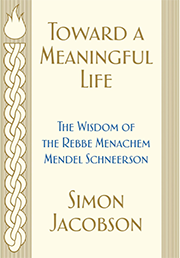 “Toward a Meaningful Life: The Wisdom of the Rebbe” by Simon Jacobson (William Morrow, 1995)
“Toward a Meaningful Life: The Wisdom of the Rebbe” by Simon Jacobson (William Morrow, 1995)
This Chassidic-inspired guide distills the teachings of the Lubavitcher Rebbe into practical, everyday wisdom. With clarity and compassion, Jacobson explores timeless themes —purpose, responsibility, love, and identity — making deep spiritual insights feel both accessible and personally relevant.
Recommended by Rebbetzin Channa Mayer, Co-Director, Rohr Chabad House at UVA.
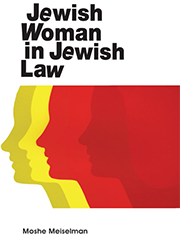 “Jewish Woman in Jewish Law” by Rabbi Moshe Meiselman (Ktav Pub. House, 1978)
“Jewish Woman in Jewish Law” by Rabbi Moshe Meiselman (Ktav Pub. House, 1978)
A traditional halachic response to modern critiques, this book explores the role and status of women in Jewish law. It engages classical sources to offer a conservative theological perspective within ongoing debates.
Recommended by Rabbi Dovid Asher, Senior Rabbi, Keneseth Beth Israel, Richmond, VA:
“I found this book many years ago to be different and to be a good articulation of a response to accusations that traditional Judaism is out of touch with modern society.”
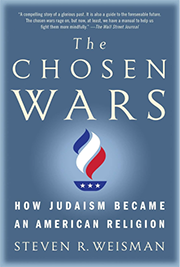 “The Chosen Wars: How Judaism Became an American Religion” by Steven R. Weisman (Simon & Schuster, 2018)
“The Chosen Wars: How Judaism Became an American Religion” by Steven R. Weisman (Simon & Schuster, 2018)
A vivid and accessible history of the passionate debates that shaped American Judaism. Weisman traces the ideological and theological clashes — from the rise of Reform Judaism to the responses of Orthodox and Conservative leaders — that transformed Judaism into a uniquely American faith. Through the lens of conflict and adaptation, this book reveals how American Jewish identity was forged.
Recommended by Rabbi Joshua Jeffreys, Jewish Chaplain and Director of Religious Life, University of Richmond.
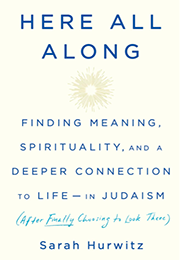 “Here All Along: Finding Meaning, Spirituality, and a Deeper Connection to Life—in Judaism (after Finally Choosing to Look There)” by Sarah Hurwitz (Spiegel & Grau, 2019)
“Here All Along: Finding Meaning, Spirituality, and a Deeper Connection to Life—in Judaism (after Finally Choosing to Look There)” by Sarah Hurwitz (Spiegel & Grau, 2019)
In this deeply personal and refreshingly relatable journey, Sarah Hurwitz — former senior speechwriter for President Barack Obama and head speechwriter for First Lady Michelle Obama — turns her finely tuned storytelling skills toward her own heritage. What begins as a curiosity becomes a heartfelt exploration of Jewish learning, ritual, and spirituality. Thoughtful, witty, and accessible, the book offers a meaningful entry point for anyone —Jewish or not — seeking deeper connection and purpose.
Recommended by a UVA Hillel Student.
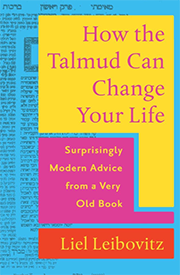 “How the Talmud Can Change Your Life: Surprisingly Modern Advice from a Very Old Book” by Leil Leibovitz (W.W. Norton & Company, 2023)
“How the Talmud Can Change Your Life: Surprisingly Modern Advice from a Very Old Book” by Leil Leibovitz (W.W. Norton & Company, 2023)
Liel Leibovitz brings the Talmud (a multi-volume compendium of Jewish oral law and commentary going back nearly 2,000 years) to life with humor, heart, and a sharp eye for modern relevance. This book is a punchy, personal guide to ancient wisdom that still hits home today. Based on the beloved Take One podcast, where Leibovitz reflects on one page of Talmud a day, the book offers big ideas, bite-sized stories, and surprisingly practical life advice.
Recommended by Carla Arton, Director of Technology Solutions, UVA Library:
“Jumping into the 10-minute daily podcast or picking up the book makes Talmud study feel totally accessible and entertaining. Leibovitz brings out the complexity and richness of the Talmud while connecting it to real, contemporary life in a way that’s both thoughtful and fun. It’s also a great way to participate in daf yomi — the daily practice of studying one page of Talmud — which is not only meaningful, but also a mitzvah (sacred obligation).”
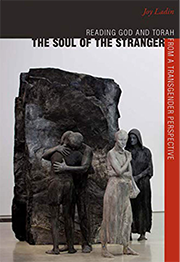 “The Soul of the Stranger: Reading God and Torah from a Transgender Perspective” by Joy Ladin (Brandeis University Press, 2019)
“The Soul of the Stranger: Reading God and Torah from a Transgender Perspective” by Joy Ladin (Brandeis University Press, 2019)
In this groundbreaking and deeply personal work, poet and scholar Joy Ladin reflects on her relationship with God, Torah, and Jewish tradition through the lens of her experience as a transgender woman. With poetic sensitivity and theological courage, Ladin invites readers into a conversation about identity, vulnerability, and divine presence, challenging traditional boundaries while seeking spiritual belonging.
Recommended by Nicholas Cummins, Research Librarian for Economics & Commerce, UVA Library.
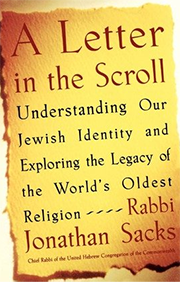 “A Letter in the Scroll” by Rabbi Jonathan Sacks (Free Press, 2000)
“A Letter in the Scroll” by Rabbi Jonathan Sacks (Free Press, 2000)
Though not American, Rabbi Lord Jonathan Sacks, zt”l, former Chief Rabbi of the United Kingdom, had profound influence in American Jewish communities. This book explores Jewish identity, continuity, and meaning with philosophical and personal depth, using the metaphor of each Jew as a letter in the Torah scroll: each one essential, each one sacred.
Recommended by: Carla Arton, Director of Technology Solutions, UVA Library:
“My favorite writer on Judaism. Nearly every page contains a sentence worth underlining —wise, reflective, and deeply human.”
Note: This post was prepared, in part, with the assistance of ChatGPT.
